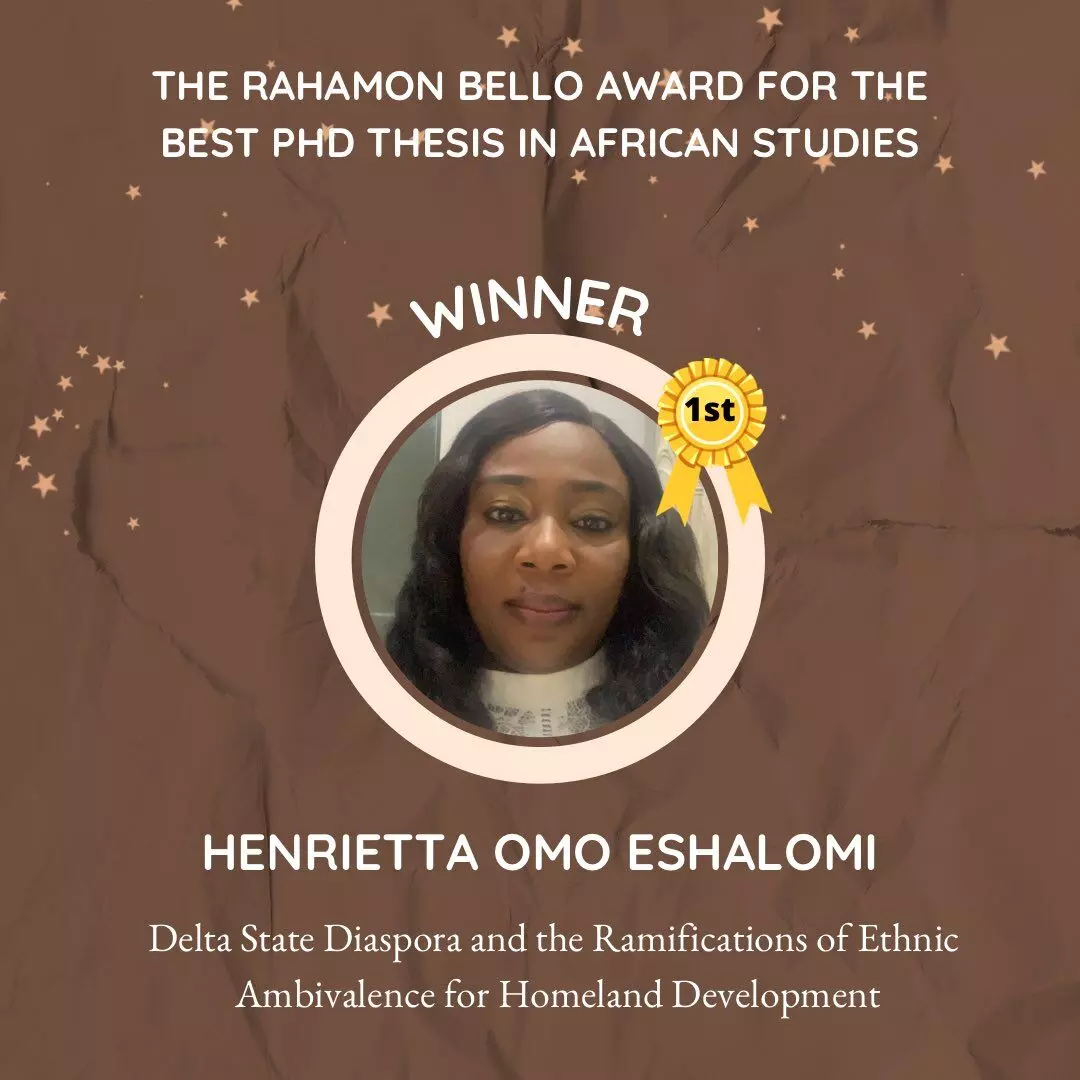Best PhD thesis award winner pledges to do more for Africa

Dr. Henrietta Omo, the first female winner of the Prof. Rahamon Bello Best PhD Thesis Award, says the feat will inspire her to go the extra mile for Africa.
Omo spoke at the presentation of her $1000 prize money and a certificate by the Institute of African and Diaspora Studies (IADS), African Cluster Centre, University of Lagos.
The event took place on Tuesday at the University of Lagos.
Omo is from the University of Ibadan.
Theaward-winning thesis examined the ethnic ambivalence among the Delta State diaspora and the ways in which the ambivalence hindered development in the homeland.
According to Omo, believing in oneself would help maximize one'spotential and attain set goals.
"I want to thank the Almighty God for His grace to achieve this. It was not easy.
"I wanted to do something differently, something that will
stand out and be counted, and today, the perseverance, commitment, and patience have paid off.
"There is no better time for me to have won this award," she said.
Omo lauded the institute for encouraging young scholars to do their best in the area of research.
She said that with the initiative, Africa would be a force to be reckoned with.
The director of the institute, Prof. Muyiwa Falaiye, said while announcing thewinner on Dec. 2 that it was the first time a female would win the award since its inception two years ago.
According to him,the award is aimed at projecting and developing young scholars.
"We at the IADS are doing this to encourage young career scholars so that we will have people to take over from the rest of us when we retire
This is one of the basic reasons IADS was founded.
"In the coming year, we intend to hold our second edition of the graduate conference." We intend to bring about 20 graduates from universities across the country down here for three days, all fully funded.
"The IADS is very big in early career development, as we fund PhD students as well as visiting postdoctoral fellows from all over Africa," he said.
He added that the institute organized conferences for PhD students from all over Nigeria as well as sent PhD students abroad for conferences and workshops.
"This year we have done that for three scholars—two to Mozambique and one who will be going to Japan in a few days. All of them are funded
through the grants won at the institute," he said.
Falaiye, a professor of African socio-political philosophy and an expert in African and Diaspora Studies, added that the institute also planned to fund PhD students admitted into IADS.
The Fellow of the Nigerian Academy of Letters said that the institute would be responsible for the tuition feesand accommodation of the students, as well as provide them with stipends for their upkeep.
"2023 will be a year for early-career scholars." "They need to be tutored, mentored, and directed properly," he said.
According to him, IADS has won researchgrants in excess of $2 million in the last two years.
He explained that the grant had been largely for research projects, the development of infrastructure in the institute, and the development of young early-career scholars.
The Vice Chancellor of the University of Lagos, Prof. Folasade Ogunsola, told the News Agency of Nigeria (NAN) on the sidelines that IADS was taking the right steps in the right direction.
"The IADS has got it right. It is supporting and encouraging early-career researchers, and that is the way to go.
"If you get them now,it can build a bigger and better university system."
"We did something similar at the College of Medicine, where, in the last 10 years, we have been working through a grant to develop early-career researchers, and it has paid off significantly.
"We are going to replicate this across the university, and it is not going to be only for the teaching staff." We are also going to develop early-career administrators.
"When you do this, you are developing people who will then impact students, and it is sustainable," she told NAN.
Prof. Rahamon Bello, the honoree for the award and the 11th Vice Chancellor of the University of Lagos,also lauded the institute's achievements.
He said that the institute was getting increasingly recognized globally for its activities.
"By the grace of God, I am the one that initiated the concept, andI am happy that the institute has grown."
"I want to thank the management of the institute led by Prof. Falaiye for doing a wonderful job to ensure that we get to the point where we are today.
"They are doing very well and I will keep supporting them in any little way pI can. "I am happy to be part of this," Bello said.
On whether there were plans to accommodate scholars outside the continent in the programme, the former vice chancellor said that there were possibilities for it if the scholars could base their works on African studies.
"Maybe, virtually, we will need to open it up to include those who are doing African studies abroad," Bello said.



